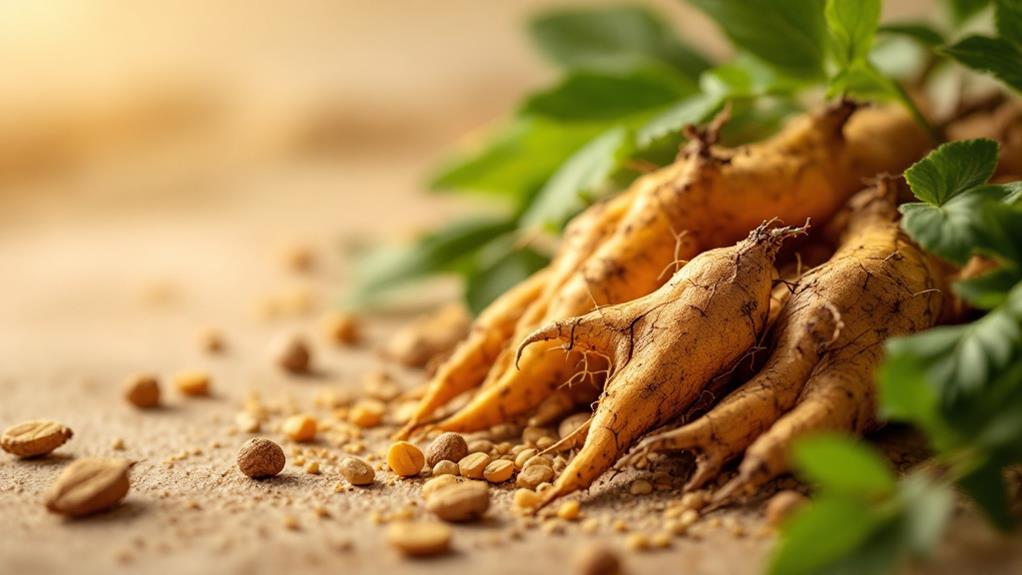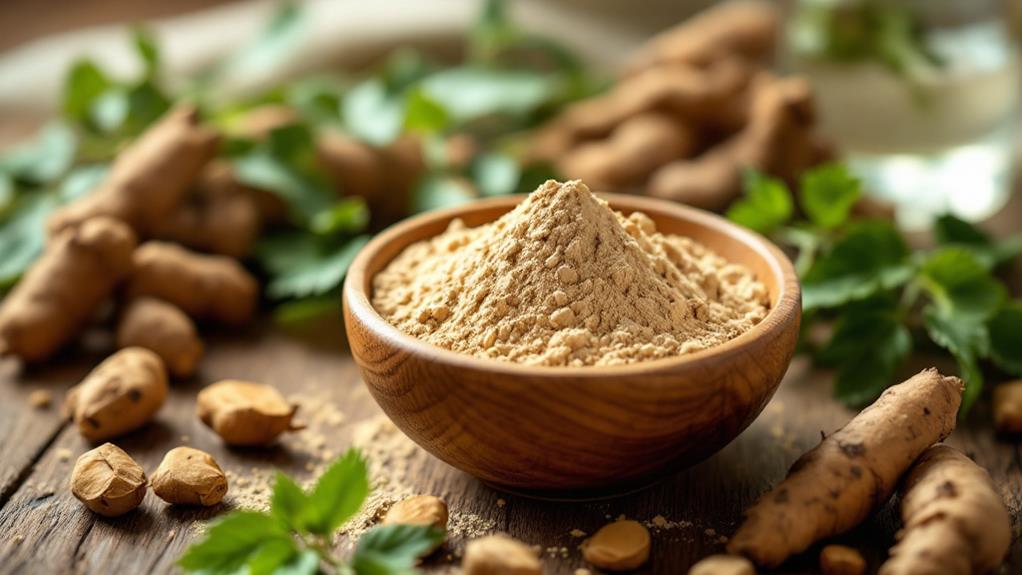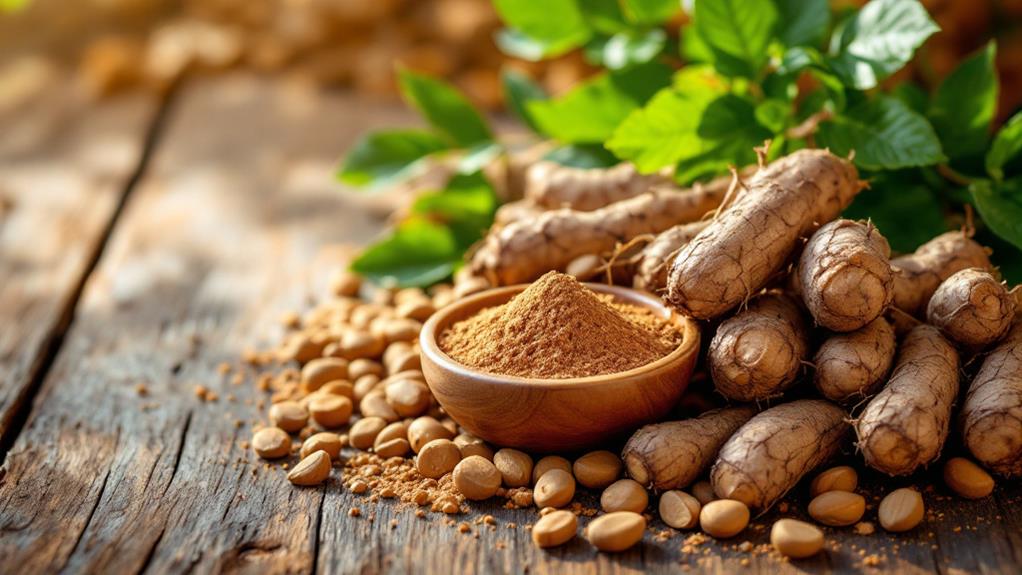Using Maca Root for Fertility: What You Need to Know

Using maca root for fertility could be beneficial as it supports reproductive health by enhancing libido, sperm quality, and hormonal balance. This Peruvian herb comes in different forms like powder and capsules, making it easy to incorporate into your diet. It's rich in protein, antioxidants, and phytoestrogens, which help regulate hormones and improve sexual function. However, watch out for potential side effects like gastrointestinal discomfort and possible interactions with hormone-sensitive conditions. Start with a low dose and gradually increase. For those keen to optimize their fertility path, there's more helpful information available.
Understanding Maca Root
Although often overlooked, understanding maca root is significant for those considering it for fertility improvement. Originating from the high altitudes of Peru, maca root (Lepidium meyenii) has been traditionally used for its potential to improve fertility. It's renowned for supporting reproductive health, playing an important role in increasing both libido and sexual function in men and women. The plant's adaptogenic properties help your body manage stress and maintain hormonal balance, fundamental factors for improving fertility.
Maca root is available in multiple forms, including maca powder, capsules, and liquid extracts, making it easy to incorporate into your daily routine. When considering its effects on fertility, research suggests that maca can positively impact libido and sexual desire. For men, studies indicate that regular consumption of maca may improve sperm quality and motility, elevating overall reproductive health.
Nutritional Benefits
Maca root doesn't just support fertility; it also packs a nutritional punch. Rich in fundamental nutrients, this powerhouse is a great supplement to your diet for overall health and wellness. With a robust profile of B vitamins, vitamin C, and vitamin E, maca root gives your body the nutrients it craves. It also boasts calcium and magnesium, important for bone health and muscle function.
Here are some nutritional benefits you can expect from incorporating maca root into your diet:
- Protein Content: Maca root is about 14% protein by weight, providing your body with essential building blocks.
- Dietary Fiber: It aids digestion and supports a healthy gut, promoting better nutrient absorption.
- Antioxidant Properties: Packed with macamides and flavonoids, maca root helps neutralize harmful free radicals.
- Low-Calorie Option: With just 60 calories per tablespoon, it's a nutrient-dense choice for any meal plan.
- Versatile Forms: Available as raw powder, gelatinized powder, capsules, or extracts, making it easy to include in daily nutrition.
Incorporating maca root into your routine can improve your health and wellness path, making it a worthy consideration for your dietary needs.
Enhancing Libido

Regarding improving libido, maca root stands out as a powerful natural option. If you're looking to elevate sexual desire, maca root powder might be the answer. Studies show it can improve libido in both men and women, increasing sexual desire and arousal with regular use. For women dealing with antidepressant-induced sexual dysfunction, a 2015 study found that a daily dose of 3,000 mg considerably improved sexual function.
For men, maca root's ability to elevate testosterone levels is particularly beneficial. Higher testosterone levels are linked to increased sexual drive and performance. Curiously, maca achieves these benefits without altering reproductive hormone levels, suggesting it works through a unique mechanism.
Alongside improving libido, maca root contributes to sexual health by enhancing sperm concentration. A 2020 study demonstrated that taking 2 grams of maca per day increased sperm concentration, supporting its role in improving overall sexual function. Regardless of you're facing fertility issues or just looking to enhance your sexual health, maca root powder offers a promising solution. With its ability to improve libido for both men and women, it's a versatile aid in addressing sexual health concerns.
Impact on Male Fertility
Beyond enhancing libido, maca root has a significant impact on male fertility. As a natural supplement, maca offers a wealth of benefits for reproductive health, backed by clinical evidence and research. It's not just about feeling more desire; maca can substantially improve your sperm motility and general semen quality. You might be wondering how it works. Here are some key findings:
- Enhances Sperm Motility: Studies show maca improves the movement and energy of sperm, essential for successful conception.
- Boosts Semen Quality: Long-term use of maca increases sperm count and semen volume, enhancing male fertility.
- Supports Spermatogenesis: Animal research highlights maca's role in enhancing the production of sperm, contributing to better reproductive health.
- Protects Against Environmental Toxins: Maca's protective effects can reduce sperm damage, maintaining sperm quality even in challenging environments.
- Improves Sexual Function: Regular intake has been linked to increased sexual satisfaction, without altering testosterone levels.
Supporting Female Reproductive Health

In relation to enhancing female reproductive health, maca root offers a blend of benefits backed by scientific research. If you're struggling with irregular menstrual cycles or uncomfortable symptoms, maca root might be your ally. It helps regulate menstrual cycles, guaranteeing they're more predictable and less painful, improving your general reproductive health. Additionally, if you're experiencing sexual dysfunction, particularly due to antidepressant use, maca root may increase sexual desire and function, restoring confidence in your intimate relationships.
Maca root contains phytoestrogens, which can balance estrogen levels and alleviate menopausal symptoms like hot flashes and mood swings. This makes it a natural option for women seeking relief from the uncomfortable changes of menopause. For those pursuing fertility, especially through assisted reproductive technologies, maca can be beneficial. Research shows it may improve fertility rates and increase ovulation, giving you a better chance at conception.
Moreover, maca's hormonal balancing effects are linked to higher progesterone levels, crucial for maintaining a healthy pregnancy. By supporting progesterone levels, maca root guarantees your body is better prepared for conception and maintaining pregnancy, making it a valuable supplement to your reproductive health regimen.
Hormonal Balance and Adaptogen Effects
Balancing your hormones can be a challenging task, but maca root might just be the adaptogen you need. This powerful root is renowned for its ability to help your body adapt to stress and mitigate hormonal fluctuations. Regardless of if you're dealing with menopause, menstrual discomfort, or looking to elevate your reproductive health, maca root could be beneficial.
Research highlights its potential to:
- Support hormonal balance by influencing progesterone and estrogen levels in women, essential for reproductive health.
- Increase testosterone levels in men, potentially improving sexual function and libido.
- Alleviate symptoms like mood swings and hot flashes as shown in clinical trials.
- Improve energy and stamina, reducing stress and fatigue that can impact fertility.
- Provide adaptogenic effects that help your body manage hormonal changes more effectively.
Potential Side Effects

When considering maca root for fertility, it's essential to be aware of its potential side effects. One common issue is gastrointestinal discomfort, such as bloating, gas, and cramping, especially at higher doses. You might also experience moodiness or insomnia if you take maca in excess or near bedtime, which can disrupt sleep patterns. If you have hormone-sensitive conditions like ovarian or breast cancer, you should steer clear of maca due to its impact on hormonal balance.
For those who are pregnant or breastfeeding, consulting a healthcare provider is imperative. The safety of maca during these sensitive periods isn't well established, so professional guidance can help you make an informed decision. Furthermore, maca may interact with medications that affect hormonal balance, making it significant for older adults or individuals taking such medications to exercise caution.
While generally considered safe, knowing these potential side effects can help you use maca more wisely. Monitoring how your body responds and adjusting your intake accordingly can minimize discomfort. Always consider consulting a healthcare professional to verify that maca is suitable for your specific health needs.
Recommended Dosage
Determining the right dosage of maca root is crucial for maximizing its benefits while minimizing side effects. Typically, the recommended dosage ranges from 1.5 to 3 grams per day, but your ideal amount depends on your health status and specific goals. Maca root is consumed in different forms such as powders, capsules, and liquid extracts. Opting for powder lets you easily mix it into foods and drinks, enhancing absorption and reducing the risk of digestive discomfort.
To find your sweet spot, consider these tips:
- Start low and slow: Begin with a smaller dosage and gradually increase to assess your individual tolerance.
- Mind your meals: Take maca with food to improve absorption and minimize gastrointestinal issues.
- Time it right: Avoid taking it in the evening to prevent potential sleep disturbances.
- Consult professionals: If you're pregnant or breastfeeding, talk to healthcare providers before starting maca.
- Consider sensitivities: Those with hormone-sensitive conditions should discuss dosage and safety with a doctor.
Scientific Evidence and Research

In recent years, scientific studies have illuminated maca root's potential impacts on fertility and sexual health. A 2020 study showed that taking 2 grams of maca daily for 12 weeks improved sperm concentration, suggesting significant health benefits for male fertility. This aligns with a broader review indicating that long-term maca use can increase semen volume and improve sperm quality, reinforcing its role in supporting male reproductive health.
While maca's effects on men are promising, there's also evidence supporting its benefits for women. For instance, a 2015 study found that 3,000 mg daily doses of maca improved sexual function in women on antidepressants. These findings hint that maca might offer a natural increase to sexual function, though results vary.
Despite these promising outcomes, clinical trials reveal mixed results regarding maca's effectiveness in improving sexual desire and function. Animal studies suggest increased sperm motility and count, but more human studies are necessary to validate these findings. The current evidence shows potential but underscores the need for larger, more thorough studies. If you're considering maca for fertility or sexual health, it's essential to weigh these findings and consult with a healthcare professional.




